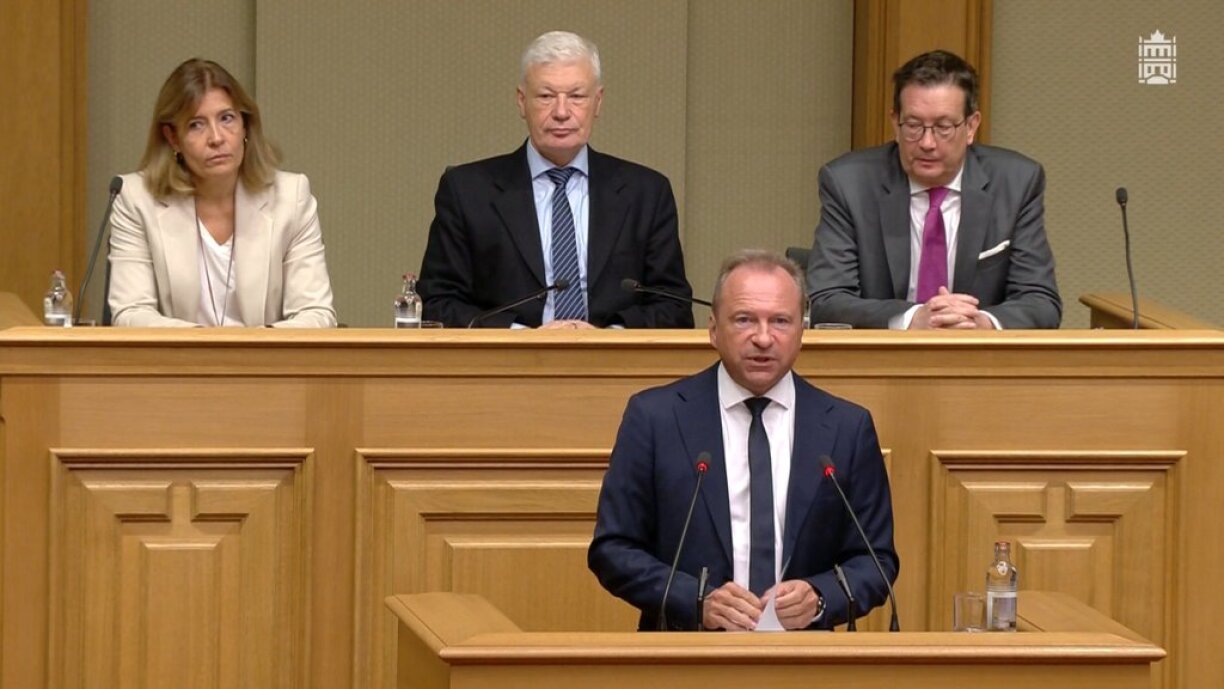
Roth described the budget as one designed to “rebuild trust” and “give citizens security in uncertain times”. Despite a projected central government deficit of €1.49 billion in 2026, or 0.4% of GDP, he stressed that Luxembourg’s finances remain “robust enough to meet the challenges of a world in imbalance”. The country’s debt-to-GDP ratio is expected to stay stable at around 27%, keeping its coveted Triple A rating intact.
STATEC forecasts economic growth of 2% in 2026, after a modest 1% this year. Inflation is projected to drop to 1.4%, while unemployment will hover near 5.9%. Roth said that “the economy remains tense across Europe”, underlining the need to “strengthen competitiveness, foster innovation, and invest massively in the future”.
Revenues are expected to rise to €31.1 billion, up 4.9%, while total expenditure will increase to €32.6 billion, or +5.7% year-on-year. The government plans continued spending on defence, social programmes, and infrastructure, calling the approach a “voluntarist and countercyclical policy of growing together”.
Luxembourg will boost defence spending to 2% of national income in 2026 – about €1.3 billion, half a billion more than in 2025 – as part of its NATO commitments. Investments include satellite capacity (GovSat1 and GovSat2), cyber defence systems, and a new “Defence Bond” programme allowing citizens to buy government bonds directly – becoming the first European nation to do so.
Roth reaffirmed solidarity with Ukraine, pledging €80 million in support next year. He also highlighted Luxembourg’s role as a “reliable international partner”, maintaining development aid at roughly 1% of national income and raising total international assistance to €872 million, or 1.36% of GNI when refugee costs are included.
Nearly half the national budget – 46% – will go to social transfers, reinforcing what Roth called “a central element of Luxembourg’s social model”. The ‘Zukunftskeess’ (Future Fund) will see its spending rise to €1.6 billion, including €1.1 billion for child benefits and €436 million for parental leave.
Tax relief will continue, with further adjustments to the tax brackets and measures to ease the burden on single parents and low-income households. A new unified tax class system is set for 2028, aimed at “treating all families equally and fairly.”
The government also plans housing investments totalling €2 billion over four years, including €480 million for direct purchases of new housing units and expanded rent and loan subsidies. “Without a home, there can be no ‘togetherness’”, Roth said, calling affordable housing “the country’s biggest concern”.
The health budget will rise by 10.5% to €494 million, supporting hospital construction and modernisation – including €136 million for the new CHL building and expansions at hospitals in Esch, Ettelbruck, and Dudelange.
Spending on employment initiatives will increase to €1.3 billion, with €60 million more for job training, youth employment, and long-term unemployment measures. Roth emphasised prevention: “We want to invest in work, not in unemployment.”
Education remains the largest domestic budget, climbing 9.2% to €4.7 billion, to accommodate growing student numbers and new schools. “We are not just building infastructure – we are creating perspectives”, Roth said.
Roth reaffirmed that “a strong welfare state goes hand in hand with a strong economy”. The budget boosts investment in AI, data, quantum, and space technologies, with €424 million earmarked through 2029 for Luxembourg’s digital and innovation strategy.
He announced the launch of MeluxinaAI, a new supercomputer, and an AI Experience Center in collaboration with the LHoFT. Partnerships like the one with Mistral AI aim to make Luxembourg a European hub for artificial intelligence.
On the financial front, corporate tax will be cut by 1 percentage point in 2027, and carried interest taxation will be revised to attract investment funds. The Sovereign Intergenerational Fund will diversify 15% of its assets into alternative investments – including 1% in Bitcoin.
Environmental spending will total €3.4 billion in 2026, part of a €13.6 billion four-year climate plan. Funds will go toward renewable energy, home renovation, and electric mobility, including €450 million for solar installations and €56 million for the “Klimabonus Mobilitéit”.
New measures include state pre-financing for energy subsidies and expanded tax credits for CO2 reductions. Roth said these initiatives reflect “a climate policy with and for the people”.
Transport and infrastructure are another major pillar, with the Mobility Ministry’s budget rising to €4.5 billion. The state will invest €3.4 billion in rail over four years and continue expanding the tram network. Road infrastructure will also receive €2.6 billion, including projects in Käerjeng, Hosingen, and Pontpierre.
Public safety and administration are also set for growth: the Police will add 220 positions, the CGDIS emergency service’s budget will rise to €166.5 million, and the Justice Ministry will receive €375 million.
Roth closed his address with a call for unity and optimism: “We must approach the recovery with confidence instead of fear, with trust instead of doubt.”
“This budget shows new ways for new growth – with people at the centre”, he said. “For our children, for our youth, for all of us – to remain what we are: a country of togetherness.”